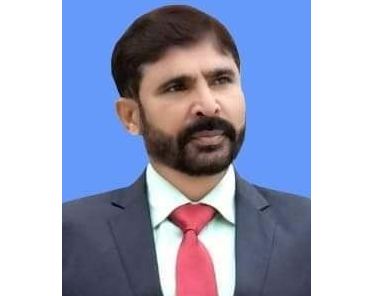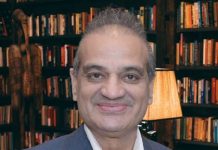Dr. Muhammad Akram Zaheer
The transformation of United States foreign policy under President Donald Trump concerning the ongoing conflict in Ukraine has sparked significant geopolitical debate.Moscow has strategically leveraged this shift to advocate for a resolution favoring Russian interests. Trump’s first official conversation with Putin on February 12, 2024, signaled an attempt to restore trust between Washington and Moscow. This marks a shift from the support for Kyiv seen in the previous U.S. administration. Kremlin spokesperson Dmitry Peskov welcomed this change, calling the U.S. position more balanced.The temporary suspension of U.S. military aid to Ukraine, withdrawal from a coalition investigating Russian war crimes and opposition to a UN resolution condemning Russia indicate a pivot from previous commitments. Moreover, Trump’s administration has increasingly echoed Russian narratives, including claims that Kyiv bears responsibility for the conflict. While Moscow remains wary of Trump’s unpredictability, the Kremlin seeks to maximize strategic gains. Russian approach is advocating for a direct Trump-Putin summit to negotiate a settlement that would weaken Ukraine’s geopolitical standing. Russian preferred determination would limit Ukraine’s military capabilities and engagement with Western alliances, ensuring continued Russian influence. If Kyiv and its allies reject such terms, Moscow anticipates that Trump may unilaterally reduce or sever U.S. support for Ukraine.
Beyond Ukraine, the Kremlin aims to pull Trump’s presidency to ease economic sanctions and improve U.S.-Russia relations. If unsuccessful, the Putin may prepare to sustain the conflict relying on itsmanpower advantage and economic resilience. Moscow quickly established contact with Trump’s team post-election, using intelligence channels and figures such as Kirill Dmitriev, CEO of the Russian Direct Investment Fund. Dmitriev’s connections to Trump’s family and advisors facilitated a prisoner exchange and a significant diplomatic meeting in Riyadh, attended by key officials including U.S. Secretary of State Marco Rubio and Russian Foreign Minister Sergey Lavrov. This marked a turning point in U.S.-Russia diplomatic engagement on Ukraine. Trump increasingly adopted Russian perspectives on the conflict. His labeling of Ukrainian President VolodymyrZelensky as a dictator and emphasis on corruption in Ukraine align with Moscow’s rhetoric. In turn, Putin endorsed Trump’s claims about the alleged illegitimacy of the 2020 U.S. election and suggested that Russia would not have invaded Ukraine had Trump remained in office.Beyond personal rapport, Moscow has positioned itself as a key player in Trump’s broader foreign policy objectives. Russia signaled willingness to assist U.S. diplomatic negotiations with Iran and support Trump’s vision of reducing global military expenditures. The Kremlin also suggested a potential recalibration of its relationship with China should Washington adopt a more conciliatory stance on sanctions. While a U.S.-Russia strategic realignment remains unlikely, the possibility has intrigued key U.S. officials, including Rubio and Vice President JD Vance. As well, Moscow has argued that American businesses have suffered financially due to sanctions. Dmitriev reportedly provided Trump’s associates with data suggesting U.S. firms lost approximately $300 billion due to the Ukraine conflict. This show the potential lucrative business ventures for Trump’s allies if U.S.-Russia relations were restored.Kremlin think that Ukraine war as a key obstacle to U.S.-Russia partnership, reinforcing Trump’s frustrations with Kyiv’s insistence on security guarantees. Putin demands that Ukraine hold elections before meaningful negotiations a stance Trump has endorsed. The Kremlin knows Trump may not immediately concede to all demands but remains optimistic about aligning U.S. policy with Russian strategic goals.
Putin’s primary objective is securing an exclusive summit with Trump, ensuring direct engagement without advisors sympathetic to Ukraine. Moscow recalls how, following the 2018 Helsinki summit, Trump publicly sided with Putin over U.S. intelligence agencies a precedent Russia hopes to replicate. With Trump’s administration now dominated by loyalists, the Kremlin expects a more accommodating stance toward Russian interests. Trump’s aspiration for a ceasefire aligns with Moscow’s broader strategy. Putin has signaled conditional willingness to accept a temporary halt in hostilities, provided Ukraine’s Western military support is curtailed. Such an arrangement would allow Russia time to regroup, rearm and resume its campaign under more favorable conditions. If Trump successfully pressures European nations to reduce support for Kyiv, Ukraine’s ability to sustain its defense would be significantly weakened. If Europe resists then Trump could threatto unilaterally end U.S. military aid. Such move may represent a major geopolitical victory for Russia, further diminishing Ukraine’s defensive capabilities and strengthening Moscow’s influence over the region.
Moscow seeks to normalize relations and lift economic restrictions. Meanwhile, Putin remains prepared to sustain the conflict if necessary, leveraging Russia’s manpower and economic resilience. The Kremlin views Trump’s growing frustration with Ukraine as an opportunity to gradually align U.S. policy with Russian objectives. Whether through a direct summit or continued diplomatic engagement, Moscow’s overarching aim is to secure strategic concessions that would solidify its influence over Ukraine and recalibrate U.S.-Russia relations in its favor.

















